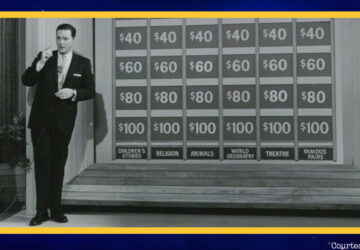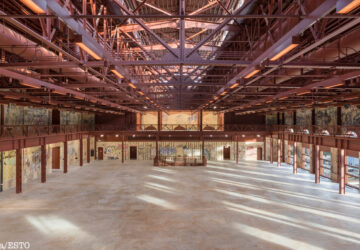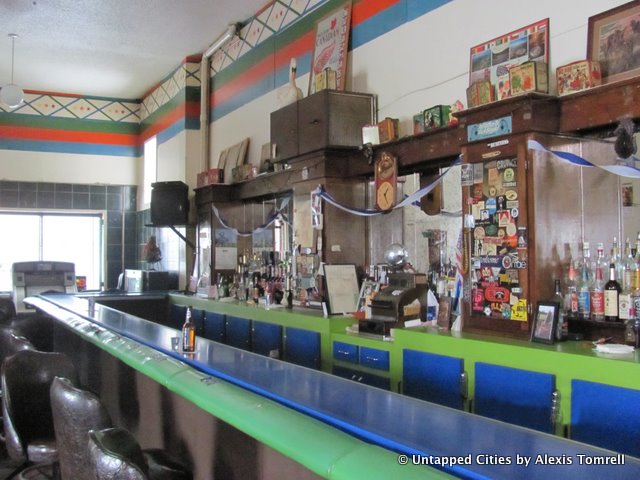A 1934 Gibson moans in and out of sleep at a downtown Detroit bar. Sagging Christmas lights clarify customers’ character as they sip Stroh’s to the nightly news. The antique bronze-plated cash register reads a blocked type of “Cash $2.00.” I stare at the tin lunchboxes I like: Nancy Drew, The Monkees and Rough Rider, on the dusty top shelf. A tiny old woman serves me a frozen Pabst Blue Ribbon. Shit. When I tell her it’s frozen, Sophia takes a long look inside the bottle and finally figures, “Hot water?” I don’t really like my beer to have the consistency of a lager slushie, but what can I do? All the beer is probably frozen today. “Yeah, sure. It’s better than waiting for this to melt.”
She runs warm tap water over the beer and slowly sits it back down on the lime green and blue bar top. It’s not”¦awful. This could be a decent treat on a hot summer day. Not now. I’m cold. This bar is cold. Steve forgot to turn down the coolers and turn on the heat again. It did freeze last night. An honest mistake. But whatever, I expect odd things to happen here. It’s why I come back.
I’m painfully aware of just how loud I’m sipping my drink. Every sound echoes in a place this empty. On some nights it gets a bit rowdy, but today, any expected drunk exclamation would be disrespectful. It’s so quiet. I look around me. The blues player passes out in between his version of Sam Cooke’s “Only Sixteen,” (my favorite by request) and the guy at the end of the bar has a tight stare on the tiny television. Steve and Sophia aren’t much for conversation tonight. Behind the bar are pinned a bunch of little kids’ school pictures, around 15 or so – blonde girls, tan little boys, a wide variety. My friend asks Sophia if those are all her grandchildren and she nods “Yes.” That’s probably not true, but blame it on the hearing. It’s better not to ask questions. You don’t get many answers here. Just smiles, and European kisses for the ladies.
This is Steve’s Place, one of the oldest, original and intact bars in Detroit. Amid rough financial times, industrial downturn and a devastating fire, the bar has held true inside the faded building next to St. Andrew’s Hall on Congress Avenue.The street is busy tonight. The parking lots are full and crowds are filing into concerts at St. Andrew’s and its basement venue, The Shelter. Out-of-towners walk by fast on their way to suburban outlets Greektown and Cobo Arena. Detroit is awake again. I’m not here for a game or concert though, just my monthly visit to see my two favorite tenants, Steve and Sophia Francis. They live and work at this bar.
Outside the frosted window, looking in, the bar suspends like a museum, or storage for Detroit novelties. Unless you’ve read about it, or some raving friend has dragged you in, most people take a quick look and assume it’s abandoned. The usual response: “People actually go in that place?” It’s true; it seems there’s no bartender, or that a gruff man demanding union membership may stall you at the door. But when you walk in, Steve up and emerges from the dark backroom, Sophia smiles from her torn booth, and their nightly entertainer and permanent houseguest, the other Steve, aka “Travelin’ Blues,” rubs the sleep out of his eyes.
Steve is a small Greek man with an honest face, high trousers, and on special occasions, a pink and blue striped tie hanging over his plaid shirt. Somewhere around his mid 80s, he muses a birth date for himself only saying, “A long time ago in Portland, Oregon.” He says he doesn’t have a birth certificate. His salt and pepper, half-shaven face speaks a thick, gentle, and sometimes-unintelligible Greek accent, colored with years of inhaling must and bar smoke. Everyone is welcomed by Steve – famous musician, curious teenager, out-of-towner, bum, and sports fan – with a “Hiya folks.” The heart melts.
Standing straight, his wife Sophia, would match him in height, around 5’5, but her tangled white hair slinks over her curved back. She is the less enthusiastic and more reclusive of the two. On some days, like today, she’ll command the bar with startling authority and start distributing beers. If you happen to get carded by this stickler, she’ll hold your ID in the light for a few good minutes to peer back and forth between the legal year sign and ID, to finally announce, “We don’t serve anyone under 18 here.” The law has been kind to Steve and Sophia.
It is pretty tough to tell what year it is inside. Unlike the loud casino bars down the street or the chain bar and grills, Steve’s Place substitutes plasma televisions, thumping bass and greasy wings for the bar ethics of an old time watering hole. Instead of facilitating a Saturday night meat market, Steve plays the classic bartender, someone who matches each drink with every face, and tells nostalgic stories to faint background music. The pair are romantic relics of a dying era.
Aside from today, the beer is usually room temperature, and the liquor bottles of Mohawk and Southern Comfort look ages. When it’s on, the tired jukebox plays a bizarre mix of music from Patsy Cline to Christina Aguilera and Alice Cooper; some popular stuff, some rare stuff. Next to it rusts a cigarette machine that advertises a false $5 for Marlboros, Camels and Newport’s, but it hasn’t been stocked in years. It’s hard to make a profit from these machines anymore. And Steve’s Place doesn’t accept credit cards. Just look at the cash register.
One night I was there with a friend of mine, and the bar was deserted. We settled in for a quiet night of conversation, amusing ourselves with talk of the knick-knacks on the wall – the random “Who put that in here?” poster of the Mariah Carey movie, Glitter, the oversized picture of an ‘80s cowgirl and the framed velvet portrait of a fox. Mid-visit, forty or so loud, and already wasted, middle-aged men walk in to celebrate of all things ”¦ a bachelor party. This was one of those “Oh God” moments in a place like Steve’s, the thing I try to avoid at other bars. Still, we waited it out, and surprisingly enough, each of the guys greeted Steve with familiar hellos and bear hugs. The bachelor orders a round of Budweiser’s for everyone. Overwhelmed by the request, my friend and I get behind the bar with Steve and start uncapping bottles. We laughed the whole time. Because, it was funny. I’d never thought I’d see a bachelor party walk in to celebrate at Steve’s of all places, and I definitely didn’t think I’d ever be working the rounds here. I’d bet we were the first employees Steve has had in twenty years.
The scenario might seem unsafe: two young girls, serving and conversing with fifty year-old men in the heart of downtown Detroit. I assure you, adults of metro Detroit, it was innocent fun. I feel safer at Steve’s than any Buffalo Wild Wings. As the night went on we heard the guys’ personal histories with the bar. I met one man named John, wearing a handmade shirt with little egg men and a walrus on it, inspired by the Beatles. He laughed at the Stroh’s I was drinking, and said; “I used to steal those out of my parent’s refrigerator in the 60s.” He always comes here to watch the Tigers’ games, just because “Steve is such a great guy.” When Ray Charles came on the jukebox, we talked about the feeling of solidarity and connection music brings to generational gaps, especially in places like this.
In payment for our assistance, Steve poured my friend and I extra, extra shots of the famous free schnapps he gifts to customers. He’s got it all – peach, root beer, butterscotch, apple. Those bottles have a shorter shelf life than the others. After our drinks he sends us to the jukebox with one dollar and the request to play his favorite song, the Eurythmics ballad “Sweet Dreams (Are Made of This” ). I’ve heard this song at least fifty times in here. He always makes me play it when I stop in, and I’m sure he listens to it five times a day. When the synthesizer starts up, Steve’s face glows and he does a little dance to the chorus. I always thought it was pure kitsch for Steve to love this song of all songs, but that night I began to understand why he plays it so often. In the most uncool of parallels, it represents his American life. Sweet dreams are made of this. He succeeded in creating a place for people to unwind, have a great time and grab a cheap drink.
Steve refers to the early ‘80s as his “good years.” The downtown music scene was high on the advent of electronic music, and St. Andrew’s was Grand Central Station. Still, according to Michael Klem, 54, a fifth generation Detroiter, historical preservationist and restorer, Steve’s Place was never booming. It was the same as it now – a favorite, yet forgotten dive.“Everyone was leaving Detroit except for crazy fuckers like me and Steve,” he said. “The people that stuck around bars like Steve’s, their entire family and social life revolved around the place. On holidays, there were big parties in these bars, because this was their adopted family, they have no one to go home to, maybe just a cat or a dog.”
Klem is working in the Mojave Desert right now, but before California he lived in Detroit most of his life. For 35 years he owned and operated fine furniture/historic preservation millworks in various downtown locations. He designed a lot of the current storefronts in the area, and that’s how he came to know Kenne Aichorn, an artist who lived in the upstairs flat with Steve and Sophia. He met his “adopted grandfather,” Aichorn, at The Palais Bar, now The Detroiter. This was the 70s, when Detroit was still reeling from the ’67 riots. The area pulls a more diverse crowd now, but back then, “The only people downtown at night we’re just weird,” Klem said. Klem moved into a warehouse across the street from Steve’s where he worked on restoration projects. Aichorn made his art at Steve’s and began pulling a patronage of musicians and artists, some of whom are there till this day. “The holdovers,” he calls them. Business was steady, until Steve’s Place burned down in the late ‘70s. Klem figures the cause of the fire was due to janky wiring. Steve did all the wiring himself, and didn’t claim to know everything.
Most of Aichorn’s art and Steve’s antiques were destroyed. The building lay in pieces. Aichorn moved out, but Steve and Sophia stayed. Klem lamented, “The back wall was just a giant plywood hole. They both slept there like you would on a construction site – clear a spot for a bed, get a five gallon bucket and call it a day.” The couple lived this way for three to five years without running water, heat or electricity. Neighbors from Greektown brought them food and water, while Steve scrounged supplies and loans wherever he could to rebuild the bar. Klem and his roommate, Kasey Butz, the artist known as KSI, began work on restoring Steve and Aichorn’s artworks and furniture. When the walls went up, Butz painted a sign on the building that read “Stev’ s Place.” Stev is an American moniker for Stavros, Steve’s original Greek name.
And, the bar’s current lime green and blue countertop wasn’t chosen as a decorative choice, but a financial one.“Steve didn’t choose lime green because he’s kinky or weird, which he kinda is, but because he was cheap. Nobody wanted that color in those days; that was hippie shit. He got it for practically nothing,” Klem said. The bar was rebuilt and business sauntered back in.
I listen in on a conversation between a “holdover” from the old days, and Steve. The guy down the bar from me is an everyday customer, a taller, graying man with a beat-up baseball cap and a voice like an old hinge. This man likes boxing. All he talks about is his damn boxing. He’s always getting ready for “fight nights,” like tonight. Steve lets him watch boxing on TV, but Steve hates boxing. Thinks the sport is too vulgar. This is the only time I’ve ever seen Steve angry, and he’s angry with the match. Him and this guy start revving it up, yelling back and forth, like friends who have known each other too long. “Why would anyone want to watch guys beating each other up?” Steve chides. “Aww gimme a break Steve. You’re just a silly old man, a silly old man. I’ll go somewhere else and watch my boxing,” the other guy squawks. He slurps the rest of his Stroh’s, wipes the spittle off his beard and finishes his speech with a low potshot, “This is why everyone in town talks about you. Now I see it. Now I see it.” Steve is defeated. He waves his hands in aggravation, puts 25 cents in my cigarette pack, grabs a cigarette and starts fuming away at his bar stool.
I’ve been in here too long. It’s already 3 a.m. Considering Steve and Sophia Francis open the bar at 10 a.m. everyday. When you live, love and never leave a bar, closing time doesn’t exist.
I’ve always been curious about the origins of Steve and Sophia. How does a man with a heavy Greek accent hail from Portland, Oregon? And if he really is from Portland, why doesn’t he have a birth certificate, or known birth date? I ask Klem about it. I get a curt, “Steve has a secret past I don’t think I can discuss.” The only details he does reveal revolve around a move Steve made back to Greece during the World War II. Documentation was rare during this time, especially for those living in secluded villages. I still don’t understand though why someone would move from Portland back to Greece during the war. Most residents were leaving Europe, not going back. I assume Portland is an adopted hometown, replacing a hard childhood or secret war work, to represent a new American beginning. Steve is too tired to tell a long story to a young customer.
In its heyday Sophia served home-cooked meals inside Steve’s Place, known especially for her homemade American fare of pork chops and mashed potatoes. Steve started bringing in bands to play on the weekends. Klem said when Steve saw a hot market, he moved on it. Then, the owner of the Sweet Water Tavern, who dabbled in vending machines and jukeboxes at the time, donated the current jukebox. Customers started adding albums to it at request.Over time, an unofficial house musician moved in, Travelin’ Blues, the blues player sleeping here tonight. When he’s awake, Travelin’ Blues has really got a sound. It’s like the masters of the Mississippi Delta blues dwell inside him, with his repertoire of over 400 original compositions, intermixed with Jimi Hendrix and Sam Cooke covers. He’s played everywhere from the House of Blues, to churches and street corners. He’ll go onto a national blues competition soon. Through all of that, he cradles Steve’s Place night and night again. I swivel my chair to watch him play, and make sure to clap for every song. Travelin’ Blues is a true, raw talent. He tells me Mick Jagger once called him, “An authentic bluesman. One of the best I’ve seen since Howlin’ Wolf.” Then he tries to sell me a homemade DVD of him on stage with G. Love.
“I’ve seen him in bad shape and I’ve seen him on top of the heap,” said Klem. He calls Travelin’ Blues “peripheral.” Like the bar itself, he’s a favorite for the forgotten. When he has them, “Blues” sells copies of his albums out of his guitar case. I purchased his album “Nightly Things” a couple years ago, and it still lulls me to sleep on rainy summer nights.
A kid near me listens to him play too. We talk a bit and he describes Steve’s Place like, “Dancing with an old Russian woman in an outhouse.” An outhouse is a grimy image, but in a weird way, what this kid, Daniel Prchlik, says, makes sense. This is a hard one to explain. It’s a realization that only comes with too many drinks, and watching Steve play the air synthesizer to the sound of Eurythmics.“I hate everywhere else and I don’t like lots of people, so why would I pay shit prices and drink with assholes down the street? So I come here. This is my place too.” Prchlik is 21. He looks 21. He talks like a fed-up factory worker. He reminds me that Steve’s Place is for people who love company and people who hate company, and that I’m not the only one under forty who enjoys coming here.
Steve’s Place speaks to a nostalgia I have toward slower times, a time I’ll never experience. Inside, I feel like I’m in the last place on Earth untouched by wireless technology and unaware of modern trends. My weekday life is one of computer screens and quick meals, until I waltz back here, where everything is slow and the same. The scene is all set. The props are all here. It’s just as I left it. There is longevity to this bar that surpasses old age and twenty-first-century change, a way about it that makes me feel old and young at the same time. It’s inevitable that Steve and Sophia won’t always be here. I doubt anyone will take over the place after they’ve gone. Regardless, each weekend I know they’ll still be there. The two won’t let go, they won’t travel, they won’t retire and they won’t die. What else could they do? Maybe play Heaven’s bartenders.
I don’t get depressed when Klem says, “Steve is gonna run that bar until he falls over.” It’s held a lot of memories and a lot of joy for many people. Seeing Steve smile away to a song he loves in a place he loves is worth all the frozen beer in the world. I don’t feel sad about the city at all.
Steve’s Place
439 E. Congress St.
(313) 961-5559









